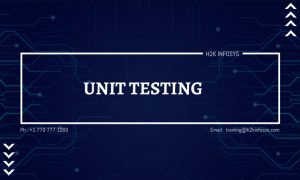In today’s competitive job market, standing out is key to securing a great position, especially in fields like Quality Assurance (QA) testing. QA testing ensures that software products meet the required standards and function as expected. If you’re interested in starting or advancing a career in software testing, joining a top-notch QA testing training program can significantly boost your job prospects.
This blog will explore why QA testing training is essential, the benefits of enrolling in the best training programs, the skills you will develop, and how they will help you succeed in your job search. Let’s dive in!
Why QA Testing Training is a Vital Skill
QA testing plays a critical role in software development. Companies rely on QA testers to identify and fix bugs before releasing software products to users. As software and technology continue to evolve, QA testers are becoming increasingly indispensable. Whether you’re working with mobile apps, web applications, or enterprise software systems, the quality of the product must be flawless to meet customer expectations and avoid costly errors.
For those entering the tech industry or looking to transition into QA, the demand for skilled professionals is growing, and companies are willing to pay top dollar for expertise in software testing.
The Growing Demand for QA Testers
According to recent studies, the global software testing market is expected to reach $60 billion by 2027, indicating rapid growth in demand for QA professionals. This is driven by companies’ increasing reliance on digital products, the shift towards automation, and the need for error-free software in highly regulated industries like healthcare, finance, and e-commerce.
If you’re looking to take advantage of this demand, investing in QA testing training can be your ticket to a rewarding and well-paying job. Now, let’s discuss why choosing the best QA testing training program is essential.
The Benefits of Enrolling in the Best QA Testing Training Program
Enrolling in a top-tier QA testing training program offers several advantages that can enhance your job prospects. Here’s a look at the key benefits:
Comprehensive Curriculum
The best QA testing training programs offer a comprehensive curriculum covering manual testing, automation testing, tools like Selenium and QTP (Quick Test Professional), and methodologies such as Agile and DevOps. A well-rounded curriculum equips you with the skills required in different industries, making you more marketable to potential employers.
Hands-On Experience
One of the most valuable aspects of a good QA testing training program is the hands-on experience. Many programs incorporate real-world projects and practical assignments that simulate actual work environments. This practical experience is essential because it helps you build confidence and apply the theoretical knowledge you’ve gained in real-life scenarios.
Access to Industry Experts
Top-quality programs often provide access to experienced professionals who have years of industry knowledge. These mentors offer invaluable insights, career advice, and networking opportunities. Learning from the best gives you a clear advantage when it comes to mastering complex QA testing concepts and techniques.
Certification and Recognition
Completing a QA testing training program from a recognized institution often comes with a certification that you can showcase on your resume. This certification adds credibility to your profile, signaling to potential employers that you have the requisite skills and knowledge to perform QA testing at a high level.
Job Placement Assistance
Many top training programs offer job placement services, helping you secure interviews and land a job after completing the course. With the support of career coaches and placement officers, you gain access to job openings that match your skills and interests.
Flexibility and Convenience
The best programs offer flexible learning options, including part-time, full-time, and online courses. This flexibility allows you to learn at your own pace, whether you’re a working professional looking to transition into QA or a recent graduate wanting to break into the tech industry.
What You Will Learn in a QA Testing Training Program
When you join a QA testing training program, you’ll develop a broad range of skills that will prepare you for a career in software testing. Here’s an overview of the key skills you can expect to learn:
Manual Testing Techniques
In the initial phase of your training, you’ll learn the fundamentals of manual testing. Manual testing involves evaluating software applications by running tests manually without using automation tools. You’ll learn how to create test cases, execute tests, and report any defects or bugs you find.
Key aspects of manual testing include:
- Understanding different types of testing (functional, regression, smoke, etc.)
- Writing test cases and test plans
- Defect tracking and reporting
- Creating comprehensive test reports
Automation Testing Tools
As you progress through the training, you’ll delve into automation testing, which is crucial for improving testing efficiency and handling large, complex applications. Popular automation tools like Selenium, QTP, and LoadRunner are often covered in QA testing programs.
Automation testing training will teach you how to:
- Write test scripts in programming languages like Python or Java
- Use frameworks like Selenium WebDriver for browser-based testing
- Automate regression tests to save time and resources
- Integrate automation tools with Continuous Integration (CI) pipelines
Agile and DevOps Methodologies
In today’s software development world, Agile and DevOps are integral methodologies for delivering high-quality software quickly. Most QA testing training programs include modules on Agile and DevOps, teaching you how to collaborate with development teams, manage sprints, and ensure that quality assurance is embedded throughout the development process.
Key Agile and DevOps skills include:
- Working in Scrum teams
- Understanding CI/CD (Continuous Integration/Continuous Delivery) pipelines
- Performing regular automated tests during the software lifecycle
- Promoting collaboration between QA testers, developers, and operations teams
Mobile and Web Application Testing
With the proliferation of mobile devices and web applications, you’ll also learn how to test software for compatibility across different platforms, devices, and browsers. Testing mobile and web applications requires knowledge of specialized tools and techniques, which are covered in advanced QA testing training.
API Testing
Application Programming Interfaces (APIs) play a critical role in modern software systems. Learning how to perform API testing using tools like Postman or SoapUI ensures that the system’s back-end components are working correctly. API testing helps identify bugs that could lead to security vulnerabilities, performance bottlenecks, or incorrect data flow between services.
Database Testing
In many software applications, the database is a key component that stores critical data. You’ll learn how to verify data integrity, test database performance, and ensure that applications can store and retrieve data accurately. Database testing often involves using SQL queries to validate backend operations.
How QA Testing Training Enhances Your Job Prospects
Now that you understand what QA testing training entails, let’s explore how it can help you land your dream job:
Increased Marketability
Employers look for candidates with a diverse skill set in QA testing. By completing a comprehensive training program, you demonstrate that you have the technical skills and practical experience required to succeed in a QA role. This makes you a more attractive candidate for positions in various industries, including finance, healthcare, technology, and e-commerce.
Expanded Job Opportunities
With a QA testing certification, you can apply for a wide range of job roles, including:
- QA Tester
- Automation Engineer
- Test Analyst
- Test Manager
- QA Lead
Additionally, the growing adoption of automation and DevOps practices is creating new opportunities for QA professionals with expertise in these areas. As more companies embrace digital transformation, they will need skilled QA testers to ensure their products are reliable and secure.
Higher Salary Potential
QA testing professionals, especially those with certifications and automation expertise, are highly sought after and can command competitive salaries. According to industry data, the average salary for a QA Tester in the United States ranges from $70,000 to $100,000 annually, with higher salaries available for automation experts and QA leads.
Career Advancement
QA testing training not only helps you get your foot in the door but also sets you up for long-term career success. As you gain experience and continue to develop your skills, you can move up the ladder to more senior positions, such as QA Manager or Director of Quality Assurance. The knowledge you acquire during your training will be the foundation for your continued growth in the field.
Networking and Professional Connections
Many QA testing programs offer access to a network of industry professionals, mentors, and peers. Building relationships with others in the QA field can open doors to job opportunities, collaborations, and ongoing professional development.
How to Choose the Best QA Testing Training Program
When choosing a QA testing training program, consider the following factors:
Reputation and Reviews
Look for programs with positive reviews from past students and a solid reputation in the industry. Do your research to ensure that the program is recognized by employers and has a track record of success.
Curriculum and Specializations
Make sure the curriculum covers all the areas you’re interested in, such as automation testing, Agile/DevOps, and mobile testing. Some programs offer specializations that align with your career goals, whether you want to focus on manual testing, automation, or a specific industry.
Job Placement Assistance
A good program should offer job placement services or support to help you land a job after completing the course. Check if the program provides resume reviews, interview coaching, or connections to hiring companies.
Flexibility
If you’re working or have other commitments, choose a program that offers flexible learning options, such as online courses or part-time schedules.
Conclusion
Enrolling in the best QA Tester Program is a smart investment in your future. By gaining the skills, experience, and certifications needed for QA testing roles, you can significantly enhance your job prospects and secure a rewarding career in a growing field
























